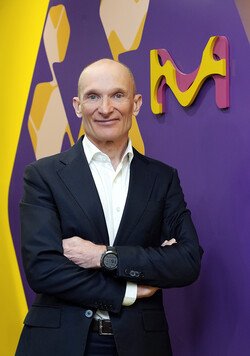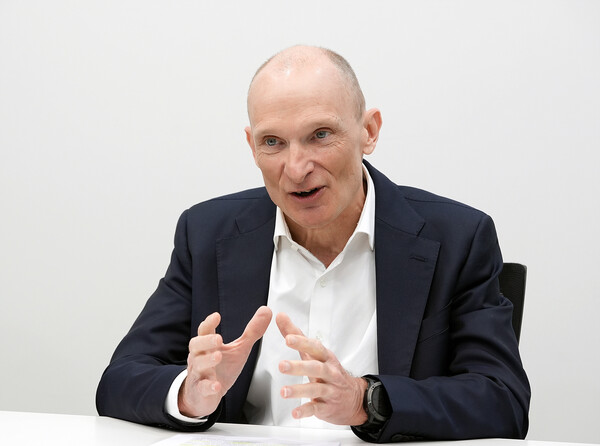With a history spanning more than 350 years, Merck, the world’s oldest pharmaceutical company, is steadfastly advancing toward becoming a global leader in healthcare. In the healthcare sector, Merck has built a remarkably stable portfolio, including oncology, neurology, immunology, endocrinology, and particularly in the field of fertility, living up to its title as the industry's longest-standing enterprise.
In 2021, the company announced its new vision to become a “global leader in specialty care.”
The Germany-based company made a strategic pivot away from its chronic disease portfolio, which had long been its cash cow, to concentrate its efforts on oncology and rare, intractable diseases. By doing so, Merck committed to evolving into a globally recognized specialty innovator, focusing on areas of high unmet medical need and pioneering advancements in healthcare.

Korea Biomedical Review met with Alexandre de Muralt, Senior Vice President APAC Merck Healthcare, who shared his insights on the strategic initiatives and challenges the company faces in the Asia-Pacific region, as well as his vision for healthcare and leadership within the industry.
Muralt first reflected on the diversity of healthcare environments across Asia-Pacific.
"The environment in Asia is very diverse. We have countries with very different healthcare ecosystems," he said, highlighting the disparity between advanced healthcare systems in countries like Australia and Korea and the more fragmented systems in places like Vietnam and India.
Despite evolving market challenges, Muralt remained optimistic about Merck's ability to make a significant impact.
"We are very proud of our portfolio because it covers the whole span of life in general,” he said. “Our purpose is curious minds dedicated to human progress and we focus on creating, improving, and prolonging life for patients."
He further emphasized the company's strategic focus in the region, stating, "We want to lead in the areas where we play. We're not the biggest mega pharma company, but a big mid-size pharma company.”
The APAC VP stressed that Merck’s aims to bring new treatment options in areas where there are high unmet medical needs.
Addressing the unique challenges and opportunities presented by the cultural and regulatory diversity in APAC, Muralt highlighted the importance of innovation and cooperation with governments.
He mentioned the ongoing unmet needs in emerging markets, such as Indonesia, where thyroid disorders remain significantly underdiagnosed, with only 3 to 4 percent of the affected population receiving proper diagnosis compared to 80 percent in countries like Australia.
"We believe there is substantial room to improve access and equity of treatment for everyone who needs it," Muralt said, pointing out Merck's commitment to collaborating closely with governments to enhance healthcare delivery.
For Merck's strategic approach towards mature markets within the Asia-Pacific region, swiftly bringing innovative solutions to patients with advanced healthcare coverage was important, he said.

Need for improved understanding and faster integration of new medical treatments
Reflecting on his extensive international experience, Muralt compared the APAC healthcare sector, including Korea, to those in Switzerland and Latin America, observing the high level of scientific research and efficient healthcare delivery.
“However, there is a need for improved understanding and faster integration of new medical treatments by governments,” he said, "There's a significant opportunity for governments to view healthcare expenditure as an investment, not a cost.”
This paradigm shift could accelerate the approval and reimbursement processes, ultimately benefiting the patient community by providing quicker access to innovative treatments, he added.
Muralt explained that when these innovative drugs can treat patients quickly, it will ultimately help the economy to be more efficient because people who are healthy can definitely contribute more to society and to the economy.
The conversation then shifted to Korea, a critical market for Merck in the APAC region.
Muralt elaborated on the strategic importance of Korea, not only within healthcare but also in the electronics and life sciences sectors.
"Our commitment to Korea is underscored by a planned 600-million-euro investment over five years, aimed at expanding our capacity to drive technological advancements,” he said. “Korea's rapid patient enrollment in clinical trials also plays a pivotal role in our global research efforts, providing valuable data that benefits the wider APAC region.”
Muralt stressed that the company's achievements in Korea include receiving reimbursement approval for Bavencio, its urothelial carcinoma treatment, in August last year.
“We are now working on another asset, Tepmetko, which is for patients with METex14 skipping non-small-cell lung cancer (NSCLC),” he said.
The vice president also mentioned ongoing open innovation platforms within Korea. "Open innovation is a cornerstone of our strategy to advance human health. By partnering with academia and startups, we leverage external innovations alongside our own. Our collaborations with Korean companies like GI Innovation and Genome & Company are testament to our commitment to fostering innovation that benefits society at large," he said.
Addressing Korea’s infertility issue
In addressing the challenges posed by declining fertility rates in Korea, Merck Healthcare stands at the forefront of efforts to mitigate this pressing societal issue. With Korea's fertility rate dropping to an alarming 0.7 in the first half of 2023, marking the lowest rate among OECD member countries, the country faces a potential decline of more than 50 percent in its population by 2100.
The gravity of the situation is further underscored by the recording of the lowest birth figure in 2023, with 235,039 births, and the rising number of individuals suffering from infertility, exceeding 250,000 in 2021.
Recognizing the severity of Korea's declining birth rate and the challenges it poses to societal prosperity and sustainability, the Korean government has initiated various support mechanisms, including financial assistance for infertility treatments and subsidies for egg vitrification.
However, the persistence of issues such as the need for heightened social awareness around fertility underscores the necessity for more comprehensive solutions.
"The focus on infertility treatments in Korea, and indeed across APAC, stems from our understanding of the profound societal implications of declining birth rates,” Muralt said. Merck recently rolled out an initiative called Fertility Counts that seeks to address the social and economic challenges associated with low birth rates in the APAC region and to provide resources to policy makers to help build family-friendly societies.
Fertility Counts goes well beyond the medical aspect of infertility, examining the broad societal structures that help or hinder young couples when they decide whether to build a family.
“Through initiatives like Fertility Counts, we aim to support governments in addressing demographic shifts, offering solutions that extend beyond medical treatments to encompass policy recommendations and societal interventions," he said. “Employers play an important part in building a family-friendly society.”
Last year, Merck announced a global fertility benefit program that will support its 66,000 employees and their partners on their family planning journeys, he added.
Muralt stressed that the program offers advice, peer-group support, and financial assistance for those who require medical intervention to build a family.
Merck Biopharma Korea had also already incorporated an Anti-Müllerian Hormone (AMH) test into its medical check-up offerings last year, to give women a better picture of their fertility and added financial support in 2024, emphasizing its dedication to employee well-being and proactive health management.
In closing, Muralt shared his vision for leadership in the healthcare industry, emphasizing the importance of fostering a culture of innovation, teamwork, and personal development within Merck.
"My goal is to cultivate an environment where every team member, regardless of their role, feels empowered to contribute to our mission of advancing human health,” he said. “By focusing on our employees' development, we not only enhance our organizational capabilities but also make a more significant impact on society.”

